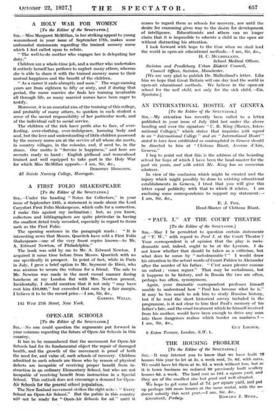A HOLY WAR FOR WOMEN
[To the Editor of the SPECTATOR.] SIR,—Miss Margaret McMillan, in her striking appeal to young womanhood in your issue of September 17th, makes some unfounded statements regarding the trained nursery nurse which -I feel called upon- to refute.
"The well-to-do mother who engages her is delegating her duty."
Children are a whole-time job, and a mother who undertakes it entirely herself has perforce to neglect many others, whereas she is able to share it with the trained nursery nurse to their mutual happiness and the benefit of the children.
"As a career it ends abruptly and soon." The wage-earning years are from eighteen to fifty or sixty, and if during that period, the nurse marries she finds her training invaluable all through life, as many married nurses have been eager to testify.
Moreover, it is an essential aim of the training of this college, and probably of many others, to quicken in each student a sense of the sacred responsibility of her particular work, and of the individual call to social service.
The children of the rich have perils also to face, of over- feeding, over-clothing, over-indulgence, harming body and soul, but the love and understanding of little children possessed by the nursery nurse are at the service of all whom she meets, in country villages, in the colonies, and, if need be, in the slums. Our motto is "Service is happiness," and here are recruits ready to hand : English girlhood and womenhood trained and well equipped to take part in the Holy War for which Miss McMillan appeals.—! am, Sir, Sm.,


























































 Previous page
Previous page